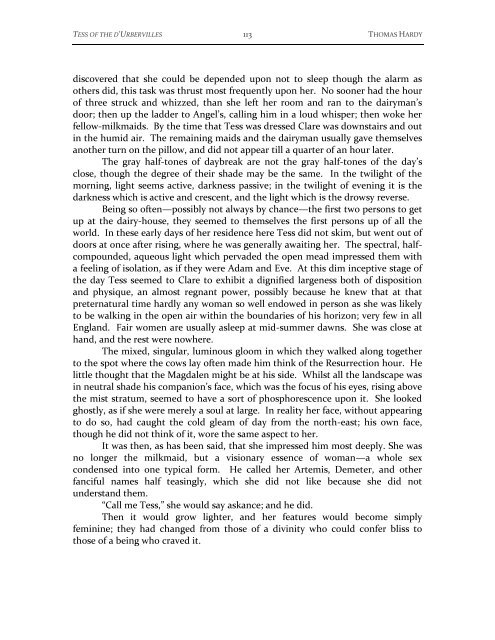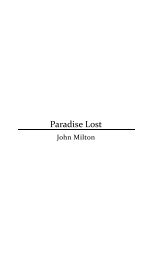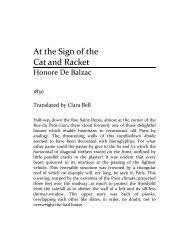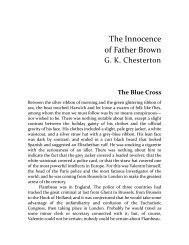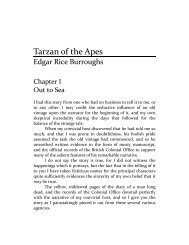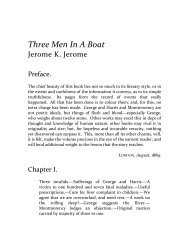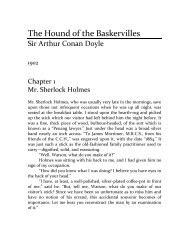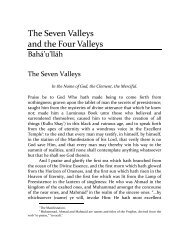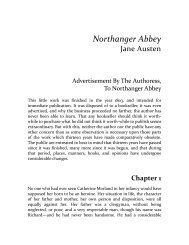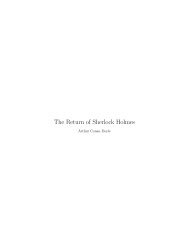Thomas Hardy - Tess of the D'Urbervilles.pdf - Bookstacks
Thomas Hardy - Tess of the D'Urbervilles.pdf - Bookstacks
Thomas Hardy - Tess of the D'Urbervilles.pdf - Bookstacks
You also want an ePaper? Increase the reach of your titles
YUMPU automatically turns print PDFs into web optimized ePapers that Google loves.
TESS OF THE D'URBERVILLES 113 THOMAS HARDY<br />
discovered that she could be depended upon not to sleep though <strong>the</strong> alarm as<br />
o<strong>the</strong>rs did, this task was thrust most frequently upon her. No sooner had <strong>the</strong> hour<br />
<strong>of</strong> three struck and whizzed, than she left her room and ran to <strong>the</strong> dairyman’s<br />
door; <strong>the</strong>n up <strong>the</strong> ladder to Angel’s, calling him in a loud whisper; <strong>the</strong>n woke her<br />
fellow-milkmaids. By <strong>the</strong> time that <strong>Tess</strong> was dressed Clare was downstairs and out<br />
in <strong>the</strong> humid air. The remaining maids and <strong>the</strong> dairyman usually gave <strong>the</strong>mselves<br />
ano<strong>the</strong>r turn on <strong>the</strong> pillow, and did not appear till a quarter <strong>of</strong> an hour later.<br />
The gray half-tones <strong>of</strong> daybreak are not <strong>the</strong> gray half-tones <strong>of</strong> <strong>the</strong> day’s<br />
close, though <strong>the</strong> degree <strong>of</strong> <strong>the</strong>ir shade may be <strong>the</strong> same. In <strong>the</strong> twilight <strong>of</strong> <strong>the</strong><br />
morning, light seems active, darkness passive; in <strong>the</strong> twilight <strong>of</strong> evening it is <strong>the</strong><br />
darkness which is active and crescent, and <strong>the</strong> light which is <strong>the</strong> drowsy reverse.<br />
Being so <strong>of</strong>ten—possibly not always by chance—<strong>the</strong> first two persons to get<br />
up at <strong>the</strong> dairy-house, <strong>the</strong>y seemed to <strong>the</strong>mselves <strong>the</strong> first persons up <strong>of</strong> all <strong>the</strong><br />
world. In <strong>the</strong>se early days <strong>of</strong> her residence here <strong>Tess</strong> did not skim, but went out <strong>of</strong><br />
doors at once after rising, where he was generally awaiting her. The spectral, halfcompounded,<br />
aqueous light which pervaded <strong>the</strong> open mead impressed <strong>the</strong>m with<br />
a feeling <strong>of</strong> isolation, as if <strong>the</strong>y were Adam and Eve. At this dim inceptive stage <strong>of</strong><br />
<strong>the</strong> day <strong>Tess</strong> seemed to Clare to exhibit a dignified largeness both <strong>of</strong> disposition<br />
and physique, an almost regnant power, possibly because he knew that at that<br />
preternatural time hardly any woman so well endowed in person as she was likely<br />
to be walking in <strong>the</strong> open air within <strong>the</strong> boundaries <strong>of</strong> his horizon; very few in all<br />
England. Fair women are usually asleep at mid-summer dawns. She was close at<br />
hand, and <strong>the</strong> rest were nowhere.<br />
The mixed, singular, luminous gloom in which <strong>the</strong>y walked along toge<strong>the</strong>r<br />
to <strong>the</strong> spot where <strong>the</strong> cows lay <strong>of</strong>ten made him think <strong>of</strong> <strong>the</strong> Resurrection hour. He<br />
little thought that <strong>the</strong> Magdalen might be at his side. Whilst all <strong>the</strong> landscape was<br />
in neutral shade his companion’s face, which was <strong>the</strong> focus <strong>of</strong> his eyes, rising above<br />
<strong>the</strong> mist stratum, seemed to have a sort <strong>of</strong> phosphorescence upon it. She looked<br />
ghostly, as if she were merely a soul at large. In reality her face, without appearing<br />
to do so, had caught <strong>the</strong> cold gleam <strong>of</strong> day from <strong>the</strong> north-east; his own face,<br />
though he did not think <strong>of</strong> it, wore <strong>the</strong> same aspect to her.<br />
It was <strong>the</strong>n, as has been said, that she impressed him most deeply. She was<br />
no longer <strong>the</strong> milkmaid, but a visionary essence <strong>of</strong> woman—a whole sex<br />
condensed into one typical form. He called her Artemis, Demeter, and o<strong>the</strong>r<br />
fanciful names half teasingly, which she did not like because she did not<br />
understand <strong>the</strong>m.<br />
“Call me <strong>Tess</strong>,” she would say askance; and he did.<br />
Then it would grow lighter, and her features would become simply<br />
feminine; <strong>the</strong>y had changed from those <strong>of</strong> a divinity who could confer bliss to<br />
those <strong>of</strong> a being who craved it.


